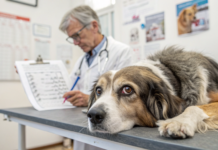Last Updated on June 11, 2023 by Dogs Vets
Dogs With Brain Tumors: Symptoms and Treatment
As loving pet owners, the health of our dogs is paramount. We understand the concern that arises when we notice something unusual about our beloved furry friends. One of these alarming conditions is the appearance of tumors.
There are several types of dog tumors, and among the most worrisome are brain tumors.
In this comprehensive guide, we delve into the realm of dog tumors, with special emphasis on brain tumors. We aim to provide a deeper understanding of the symptoms and available treatments, aiding dog owners in these difficult situations.
Understanding Dog Tumors
A tumor is an abnormal growth of cells that can be benign (non-cancerous) or malignant (cancerous). In dogs, these tumors can occur anywhere, from the skin to internal organs, including the brain.

Some common types include dogs mast cell tumors, dog mammary tumors, and skin tumors.
Dog Mast Cell Tumors
Mast cells are part of the dog’s immune system and are found throughout the body. Mast cell tumors are a common type of skin cancer in dogs, but can also affect other areas of the body. More on mast cell tumors.
Dog Mammary Tumors
Approximately half of the tumors in female dogs are mammary tumors. Spaying a female dog before her first or second heat cycle significantly reduces the risk of developing this type of tumor. Learn about prevention of mammary tumors.
Dog Skin Tumors
Skin tumors are quite common in dogs. They can appear anywhere on the body and vary greatly in appearance. Some might be harmless, but others could be dangerous, like melanomas. Early detection and treatment can lead to better outcomes. More about skin tumors.
Recognizing Dog Brain Tumors
While dog tumors on the skin or dog tumors on the leg are easier to spot, detecting a brain tumor can be challenging. Nevertheless, being aware of certain signs can help identify the issue earlier.
Symptoms of Brain Tumors in Dogs
Common symptoms include behavioral changes, loss of coordination, seizures, and difficulty seeing. Symptoms may vary depending on the tumor’s location in the brain.

It is crucial to contact a veterinarian immediately if any of these symptoms are observed.
Dog Tumors: Diagnosis and Treatment
Diagnosis usually involves a thorough physical examination, lab tests, and imaging techniques like MRI or CT scans. Treatment options include surgery, radiation therapy, chemotherapy, and supportive care.
Surgery
Surgery is the primary treatment for many dog tumors, particularly if they are localized and haven’t spread to other body parts. The vet will try to remove as much of the tumor as possible without causing undue harm.
Radiation Therapy
Radiation therapy uses high-energy rays to kill cancer cells. This treatment is often used for dogs with cancerous tumors that can’t be removed completely through surgery or are located in places difficult to reach surgically.
Chemotherapy
Chemotherapy is the use of drugs to kill cancer cells. It is often used in conjunction with surgery or radiation therapy for the most effective treatment.
Supportive Care
Apart from specific treatments, providing a comfortable and stress-free environment for the dog is vital. Regular vet check-ups, balanced nutrition, and loving care can significantly improve the dog’s quality of life.
Dog Tumors Bleeding: Emergency Care
If you notice your dog’s tumors bleeding, seek immediate veterinary care. This could be a sign of a severe condition that needs immediate attention. Bleeding tumors can lead to complications like infections and anemia.
How to Treat Dog Tumors at Home
While professional veterinary care is crucial for the diagnosis and treatment of tumors, there are ways to make your dog more comfortable at home. However, it’s important to note that home remedies should never replace professional treatment.
- Manage Pain: Your vet can recommend safe pain medications to help manage your dog’s discomfort. Make sure to follow the prescribed dosage.
- Proper Nutrition: A well-balanced diet is essential for your dog’s overall health and recovery. Some foods have anti-cancer properties and can be added to their diet. Always consult your vet before making any dietary changes.
- Physical Comfort: Make sure your dog has a comfortable space to rest. For dogs with mobility issues due to tumors, consider using supportive devices like harnesses or ramps.
- Regular Check-ups: Regular follow-ups with the vet are essential to monitor your dog’s condition and make necessary adjustments to the treatment plan.
Remember, while these steps can help, they are not a substitute for professional veterinary care. Always consult with your vet for the best treatment options for your pet.
Conclusion
Dealing with a diagnosis of dog tumors, especially brain tumors, can be an emotionally taxing time for pet owners. However, with early detection and appropriate treatment, many dogs can live comfortable and fulfilling lives.
Education about the different types of dog tumors, their symptoms, and treatment options is key to providing the best care for our beloved companions.
Always stay vigilant for signs of illness and consult with a professional vet as soon as you notice something off. Remember, your dog’s health depends on you.
Frequently Asked Questions
What are the most common types of dog tumors?
The most common types of dog tumors include mast cell tumors, mammary tumors, skin tumors, and brain tumors.
Can dog tumors be treated at home?
While certain supportive measures can be taken at home, the actual treatment of dog tumors should always be under the supervision of a professional vet.
How can I identify a brain tumor in my dog?
Signs of a brain tumor in dogs can include behavioral changes, loss of coordination, seizures, and difficulty seeing. Always consult a vet if you notice any of these symptoms.
Can all dog tumors be removed with surgery?
Whether a tumor can be removed surgically depends on several factors, including the type of tumor, its location, and whether it has spread to other parts of the body.
What should I do if my dog’s tumor is bleeding?
If you notice your dog’s tumor bleeding, seek immediate veterinary care. This could be a sign of a serious condition that needs immediate attention.
What is the life expectancy of a dog with a brain tumor?
Life expectancy can vary greatly depending on the type and location of the tumor, the age and overall health of the dog, and the treatment provided.
Are all dog tumors cancerous?
No, not all dog tumors are cancerous. Some tumors are benign, meaning they do not spread to other parts of the body. However, they can still cause health issues and should be evaluated by a vet.
References
Fact Check
We strive to provide the latest valuable information for pet lovers with accuracy and fairness. If you would like to add to this post or advertise with us, don’t hesitate to reach us. If you see something that doesn’t look right, contact us!























